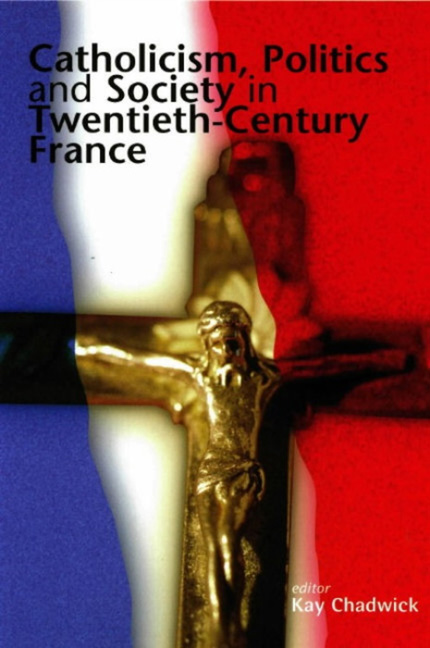Book contents
- Frontmatter
- Contents
- Editor's preface
- Notes on contributors
- Abbreviations
- Introduction
- 1 La laïcité en France au vingtième siècle
- 2 Antisémitisme des catholiques au vingtième siècle: de la revendication au refus
- 3 Catholicism and Nationalism: the Fédération républicaine, 1927–39
- 4 True and false modernity: Catholicism and Communist Marxism in 1930s France
- 5 Ralliés and résistants : Catholics in Vichy France, 1940–44
- 6 Les formes politiques de la démocratie chrétienne en France au vingtième siècle
- 7 Catholicism and the Left in twentieth-century France
- 8 Accueillir l'étranger : immigration, integration and the French Catholic Church
- 9 Yeast in the dough? Catholic schooling in France, 1981–95
- 10 Les femmes catholiques: entre Église et société
- 11 La sociologie religieuse du catholicisme français au vingtième siècle
- 12 Secularisation and the (re)formulation of French Catholic identity
- Select bibliography
- Index
5 - Ralliés and résistants : Catholics in Vichy France, 1940–44
- Frontmatter
- Contents
- Editor's preface
- Notes on contributors
- Abbreviations
- Introduction
- 1 La laïcité en France au vingtième siècle
- 2 Antisémitisme des catholiques au vingtième siècle: de la revendication au refus
- 3 Catholicism and Nationalism: the Fédération républicaine, 1927–39
- 4 True and false modernity: Catholicism and Communist Marxism in 1930s France
- 5 Ralliés and résistants : Catholics in Vichy France, 1940–44
- 6 Les formes politiques de la démocratie chrétienne en France au vingtième siècle
- 7 Catholicism and the Left in twentieth-century France
- 8 Accueillir l'étranger : immigration, integration and the French Catholic Church
- 9 Yeast in the dough? Catholic schooling in France, 1981–95
- 10 Les femmes catholiques: entre Église et société
- 11 La sociologie religieuse du catholicisme français au vingtième siècle
- 12 Secularisation and the (re)formulation of French Catholic identity
- Select bibliography
- Index
Summary
In June 1940 French Catholics were in ambivalent mood. While there was dismay at the way in which Hitler had laid waste the allied armies, there was also hope for the future. Marshal Pétain's government promised a return to traditional values. In the event, Vichy proved a disappointment, and opened up divisions within the Church that had been eclipsed at the moment of defeat. As has been observed, in the 1920s and 1930s a ‘relaxed tension’ in Church–State relations ‘loosened the tight discipline’ that was forged during the anti-clerical phase of the Third Republic when committed Catholics had rallied to the defence of religious liberties. Accordingly, conservatives in the hierarchy became concerned that they were ‘losing control over the disparate enthusiasms’ of the lower clergy and laity. Under the Occupation, ironically a time when Pétain called for restraint, there was worry that this indiscipline would get out of hand. Although most Catholics obeyed their bishops, a minority of rank-and-file adherents made their opposition to both Vichy and Nazism plain. Ultimately, these ‘resisters’ redeemed the actions of their superiors who had hoped to profit from national humiliation by establishing a Third Ralliement.
In summer 1940, the power of the Catholic Church remained firm. As Hall argues, whereas the State bureaucracy crumbled before the German advance, clerical institutions survived largely ‘intact’. Despite the division of France into two, the hierarchy continued to function. On 28 August 1940 the Assemblée des cardinaux et archevêques (ACA) re-convened at Paris, although admittedly it was only members of the northern episcopate who were able to attend. The international links of the Church also remained in place, evidenced by the interest which the Vatican took in the destiny of France. As well as accrediting Valerio Valeri as the Papal Nuncio to Vichy, on 29 June 1940 Pius XII addressed French bishops outlining his hopes for their country's revival. Nor had the educational structures of the Church been dislodged by Guderian's Panzers. In 1940 almost a million children attended Catholic primary schools, roughly one-fifth of the school population; in the secondary sector, Catholic institutions taught a third of all pupils.
- Type
- Chapter
- Information
- Publisher: Liverpool University PressPrint publication year: 2000



